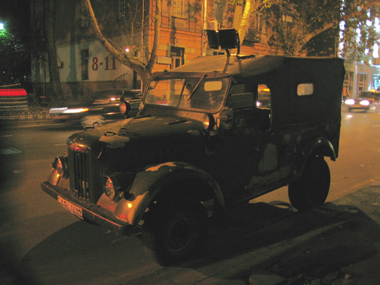


Ghost Machine (version #1)
Channeling the Specters of Paranormal Politics
The streets of Tbilisi, Georgia are haunted by a palpable past, an ever-shifting present, and an unknowable, yet all too predictable, future. At the center of an economic and strategic proxy war between the US and Russia, Georgia is possessed by a newborn democracy that is equal parts triumphant spirits and ominous phantoms. In the post-Soviet capitol city of Tbilisi, the remnants of remarkable architecture crumble to make way for international banks, luxury hotels, and the newly-funded Baku-Tbilisi-Ceyhan oil pipeline. And amidst the hopes and the fears, the rubble and the glitz, comes… the Ghost Machine.
An eerie mix of moans, groans, growls, and howls blares out across the city from the public-address loudspeakers mounted atop of an antique Soviet-era military vehicle. As it creaks and rumbles down the main thoroughfare of Rustaveli Avenue, the Ghost Machine gives voice to the competing anxieties and many restless spirits gathering in the shadows. These sonic emanations intervene in the aural landscape and provoke the living with uncanny reminders of what has been and mysterious manifestations of what yet may be. Like the city itself, the bashed and battered truck appears to have lived many lives, having died and been resurrected more than once. Now it is invoked to meet a new set of challenges.
One hundred and sixty years ago, Marx opened the Communist Manifesto with the words, “A specter is haunting Europe. It is the specter of Communism.” In the wake of Soviet communism, the global economics of neo-liberal capitalism has yet to fully banish this specter from Tbilisi, but not for lack of trying. Nearly the entire center-city is in the midst of redevelopment as the unique mix of Byzantine, Art Nouveau, and Stalinist Neoclassical architecture submits to retail chains, banks, and fast food.
At one end of the main drag, the skeleton of a massive high-rise clamors with construction workers laboring to transform the Soviet hotel-turned-refugee-camp into the new luxury Radisson. Across the way, McDonald’s faces off against Rose Revolution Square, the plaza where the non-violent Rose Revolution replaced a corrupt government with newborn democracy in 2003. And a little further down the way, the former “Institute of Marxist and Leninist Thought” is being transformed into a massive 5-star hotel.
In the middle of the night, the Ghost Machine haunts each of the sites in turn, along with several others including the Ministry of Justice, City Hall, Parliament, and more. Sleepy residents bury their heads in their sheets. Cabbies snicker along conspiratorially. Drunks and thugs stare slack-jawed in disbelief. The police gather en masse to complain authoritatively. But despite these attempts to exorcise the Ghost Machine, the ghosts themselves still haunt Tbilisi.
The Ghost Machine was created with the curatorial support of Lydia Matthews and Ani Riaboshenko as part of Project One Stop for Art Caucasus 2007 - International Arts Forum.